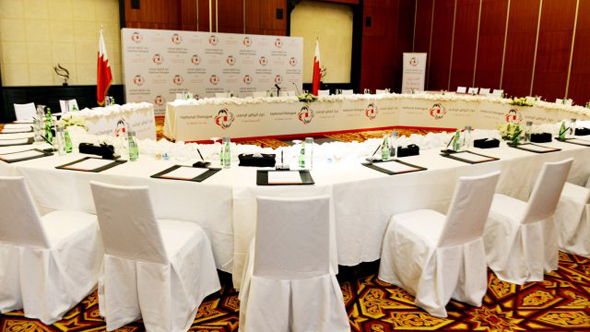What’s a Political Society to do? Al-Wefaq’s Decay
Bahrain Top Stories
What’s a Political Society to do? Al-Wefaq’s Decay
When Al-Wefaq’s General Secretary, Ali Salman, established the party – Bahrain’s largest – he couldn’t have guessed that the hopeful group which brought all coalitions in the Shiite community together with academics and influential persons would, just a few years later, be rapidly decaying in its membership and influence.

What’s a Political Society to do? Al-Wefaq’s Decay
By Noora Al-Mutawa
When Al-Wefaq’s General Secretary, Ali Salman, established the party – Bahrain’s largest – he couldn’t have guessed that the hopeful group which brought all coalitions in the Shiite community together with academics and influential persons would, just a few years later, be rapidly decaying in its membership and influence. Its attempts to appease the contradictory views of its members have resulted in displays of a schizophrenic character: at times it participates in and engages with the government; at other times it boycotts parliament and negotiations. Al-Wefaq has thus been unable to achieve the most basic elements of its program or maintain the presence in parliament usually afforded by a majority opposition, leading members to break away and form fringe groups, the most recent being the “Youth of February 14th” (YF14).
A question begs to be asked: is Al-Wefaq a nationalist party, or does it represent the interests of a small group or even of Iran?
In its history, Al-Wefaq faced three devastating fractures. Freshly formed and lacking a developed political program, it turned to the use of religion to unite its members, deploying Ayatollah Isa Qassim and basing its activities on fatwas. The academics soon defected, disturbed by the religious transformation and by Ali Salman’s submission to the groups’ radicals with his decision to boycott the 2002 elections – a move which isolated Al-Wefaq from its core constituents and from the government. Realizing that with this strategy no objectives were being accomplished, the decision was made to participate in parliament in 2006, angering the radicals, who left and created the Al Haq movement.
A contingency plan: the national dialogue
Al-Wefaq pulled out of parliament for a second time in 2011, in objection to the dramatic security response to the protests of the same year. Failing again to achieve their aims through withdrawals, forced them into a contingency plan in order to foster support in the community. They joined the current national dialogue. Al-Wefaq’s inability to negotiate its demands with the government and Sunni factions caused even more members to leave out of disillusion, and led its former sympathizers to suspect its motives, with growing suspicion that Al-Wefaq was stalling progress on behalf on Iran. Even more troubling is the subsequent sprouting of the YF14, a paramilitary organization supposedly created out of this disillusion and opposed to any dialogue with the government.
The YF14
The YF14 is a clandestine group which has admitted to numerous terrorist attacks against civilians and the state. Their mystery has led to a few rumors. One is that they are Hezbollah’s Military Wing in Bahrain, which Hezbollah acknowledged creating. This theory would explain where they receive their weapons, training and funding. So would another rumor, which opines that the leaderless YF14 receives its funding and orders from Al-Wefaq, who wants to have its cake and eat it too – satisfy the radicals and use terror to add urgency to their demands in the national dialogue, while maintaining a respectable image in order to appease the moderates and sustain engagement with the government. Indeed, it is hard to believe that Qassim could not stop these para-militants with a simple fatwa. On the contrary, when police officers were murdered on his demand to “crush” security forces, he plainly states that it is not his fault if YF14 didn’t “get” the metaphor.
Observers have noted that the violence of YF14 has been used by government to discredit the opposition as a whole, causing a stalemate in the negotiations. In fact, this orientation can be recognized in society as well, with blogs and local newspapers generalizing when speaking of acts of protest, and often viewing the government as protector against a faceless security risk all of the opposition seems to pose. Once again, Al-Wefaq’s plan has backfired; their “easy way out” of their internal contradictions has engendered a loss of respect, with growing societal disapproval at negotiations with a group seen as irresolute and violent, and the diminished likelihood of achieving their goals.
A question begs to be asked: is Al-Wefaq a nationalist party, or does it represent the interests of a small group or even of Iran? It is time for Al-Wefaq to mature and own up to their vital role in Bahraini civil society, guiding their members towards the path of reform and representation. It must disassociate itself from the YF14 and condemn their terrorism. Al-Wefaq must give itself the opportunity to achieve its core objectives and gain the respect of government and society, or else it will be relegated to the footnotes of history.